Description
CHAPTER ONE
1.0 INTRODUCTION
This project is on Discourse analysis on the 2015 election campaign flayer-poster in Lagos state. For any democratic system to thrive, it is vital that political parties and candidates provide the electorates with adequate information on party policies, clear cut vision as well as their political agendas to enable electorates actively choose their candidates based on full information. To achieve this, political parties use the media in campaigns. Curran 2005:129 adds that the media assists voters to make an informed choice at election time. This is done in form of paid political advertising, social media campaigns, commentaries and news stories. In fact, for an election to be considered free and fair, electorates must have adequate knowledge of the candidates, political parties and election policies
Recently, political parties and their candidates are becoming increasingly aware of the effectiveness of advertising and its role in getting the electorates to choose a particular candidate or party over the other by way of informing them. The use of political ad campaigns has become increasingly popular and is very important to the electoral process and voting behavior because it bridges the communication gap between political parties, political candidates and electorates. Hence, political parties and candidates all around the world devote a lot of financial resources to political ad campaigns to sell themselves as the preferred brand to the electorates. Interestingly, the most questions raised in elections are concerned with voting behavior i.e. why the electorates voted for a candidate over the other and the implication of their choice.
Scholars and communication experts argue that, when the politician crafts his campaign messages as being the fight to improve voters lives, or something similar and come with some good measure of integrity, the voters are more likely to believe him Feyipitan 2015. In other words, the electorates are most likely to trust candidates whose political ad campaigns offer to satisfy their basic needs as opposed to those who dwell on their personal achievements. However, these same experts also argue that personality, appearance and language use play crucial roles in political ad campaigns. Still, many political experts question the efficacy of political ad campaigns in getting the electorates to vote in a candidates favour.
The recently concluded 2015 gubernatorial elections in Lagos state, witnessed political parties and candidates flooding various forms of media with ad campaigns all struggling to win electorates votes. At the end, Akinwunmi Abode who was the candidate of the All Progressive Congress APC emerged as the governor of Lagos State. Before the elections, his ad campaigns filled media airwaves, social media and billboards with messages for every class of people who made up the electorates. His pervasive jingles dominated radio and television stations, social media sites while his messages streamed the print and outdoor media with promises to deliver. However, the extent to which his media campaigns fostered his win remains unknown.
1.1 BACKGROUND OF THE STUDY
Politics is a struggle for power in order to put certain political, economic and social ideas into practice. In this process, language plays a crucial role, for every political action is prepared, accompanied, influenced and played by language Garret, 2001, p.626. This research analyzes discourse of political speech, namely by the Turkish Prime Minister Recep Tayyip Erdogan during a debate. Given the enormous domestic and global significance of the said speech, it is crucial to decipher ideological traits typical of Erdogan enshrined in his political discourse. The aim of this paper is to examine the impact of identity and linguistic background on Prime Minister Erdogans political discourse and the ideological components of his speech.
Language is closely bound up with our social and cognitive development from childhood, and our identity formation. The attitude that a listener can adopt towards the speech of another speaker has been a significant issue in sociolinguistics. The study of language attitudes is one of the most important topics in the social psychology of language. Much of the work on language attitudes has been conducted under the rubric of the social psychology, but sociolinguistics has always shared overlapping concerns and involvements Garret, 2001, p.626. Trudgil 1992 describes language attitudes as the attitudes which people have towards different languages, dialects, accents, and their speakers Trudgil, 1992, p.44. Such attitudes may range from very favourable to very unfavourable, and may be manifested in subjective judgments about correctness, worth and aesthetic qualities of varieties, as well as the personal qualities of their speakers. Whilst linguistics studies have shown that such attitudes have no linguistic basis, sociolinguistics studies have proven that attitudes are social in origin, and they may have important effects on language behaviour, being involved in acts of identity and linguistic change.
One example of the first language attitude studies was conducted by Labov in 1966 where he walked around 3 NYC department stores, asking the location of departments he knew were on the fourth floor. By pretending not to hear, he had each informant pronounce the two words twice, once spontaneously, and once carefully.
Discourse is a broad term with various definitions which integrates a whole palette of meanings Titscher et al., 2000, p.42, covering a large area from linguistics, through sociology, philosophy and other disciplines. According to Fairclough 1989 the term refers to the whole process of interaction of which a text is just a part Fairclough, 1989, p.24. As pervasive ways of experiencing the world, discourses refer to expressing oneself using words. Discourses can be used for asserting power and knowledge, and for resistance and critique. The speaker expresses his/her ideological content in texts as does the linguistic form of the text. That is, selection or choice of a linguistic form may not be a live process for the individual speaker, but the discourse will be a reproduction of that previously learned discourse. Texts are selected and organized syntactic forms whose contentstructure reflect the ideological organization of a particular area of social life Dellinger, 1995.
According to Schaffner 1996, political discourse, as a subcategory of discourse in general, can be based on two criteria: functional and thematic. Political discourse is a result of politics and it is historically and culturally determined. It fulfills different functions due to different political activities. It is thematic because its topics are primarily related to politics such as political activities, political ideas and political relations.
Power is a complex and an abstract idea and has a significant influence on our lives. It is the ability of its holders to exact compliance or obedience of other individuals to their will The New Fontana Dictionary of Modern Thoughts, 1999, p.678. According to Edelman 1977, the power holder is a person who can exercise influence outside the context of formal proceedings thus wielding real power Edelman, 1977, p.123. Language has a key role in the exchange of values in social life and transforming power into right and obedience into duty. It may both create power and become an area where power can be applied. Social values and beliefs are the products of the institutions and organisations around us, and are created and shared through language. Rousseau 2004 highlights this point saying the strongest is never strong enough always to be master unless he transforms his power into right and obedience into duty Rousseau, J.J., cited in The New Fontana Dictionary of Modern Thoughts, 1999, p.678. Edwards 2006 notes that people do not react to the world on the basis of sensory input but, rather, of what we perceive that input to mean Edwards, 2006, p.324. This is because language use corresponds to views of the social status of language users, thus providing simple labels which evoke social stereotypes that go far beyond language itself. For instance, listening to a given variety, acts as a trigger or a stimulus that evokes attitudes or prejudices or stereotypes about the community to which the speaker is thought to belong. According to Wareing 2004, the affective function of language is concerned with who is allowed to say what to whom, which is deeply tied up with power and social status Wareing, 2004, p.9. In other words, how individuals choose and use different language systems varies according to who the speakers are, how they perceive themselves and what identity they want to project. Language use also varies according to whether the situation is public or private, formal or informal, who is being addressed and who might be able to overhear. Likewise, Meyerhoff 2006 points out that we draw very powerful inferences about people from the way they talk.
1.2 OBJECTIVES OF THE STUDY
After a critique view of the past election the researcher sort to go in discourse of the past election and analyze the election held and the effect of the campaign flayer and posters used for the election, examine the message it convey to the people. This research work specifically examined political ad campaigns Flayer amp; Posters of the All Progressive Congress APC and that of the People Democratic Party PDP gubernatorial candidate in Lagos state.
1.3 SIGNIFICANCE OF THE STUDY
The outcome of this research work will help the political and electoral body manage their election campaign. Get better ways to penetrate the citizens and influence then on their vote.
1.4 SCOPE OF THE STUDY
This research work only covers Lagos state, and basically the two ruling and wining parties All Progressive Congress and the People Democratic Party APC amp; PDP. Also, this research work is a study of the last election, the 2015 election only.
1.5 LIMITATION OF THE STUDY
During the course of performing/researching this project work, the researcher encountered a lot of challenges as well as opposition which ranges from financial constraints, time factor, sourcing of material etc. this factors in their own ways, slowed down the speedy progress of this work that resulted to the researcher not being able to finish the research work on time as is required.

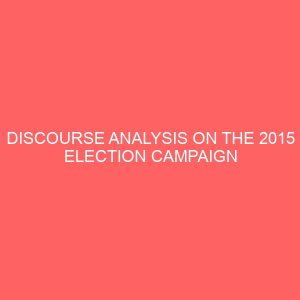
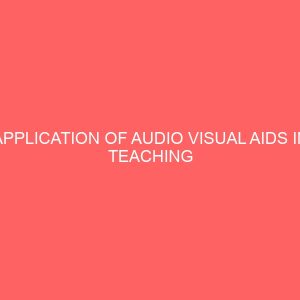
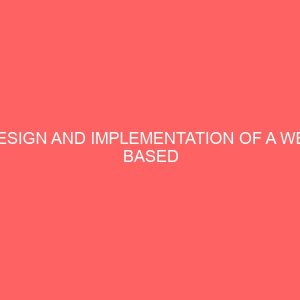
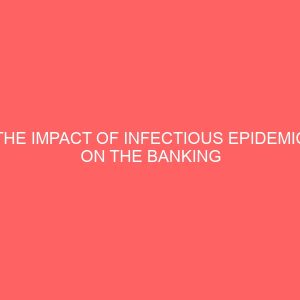
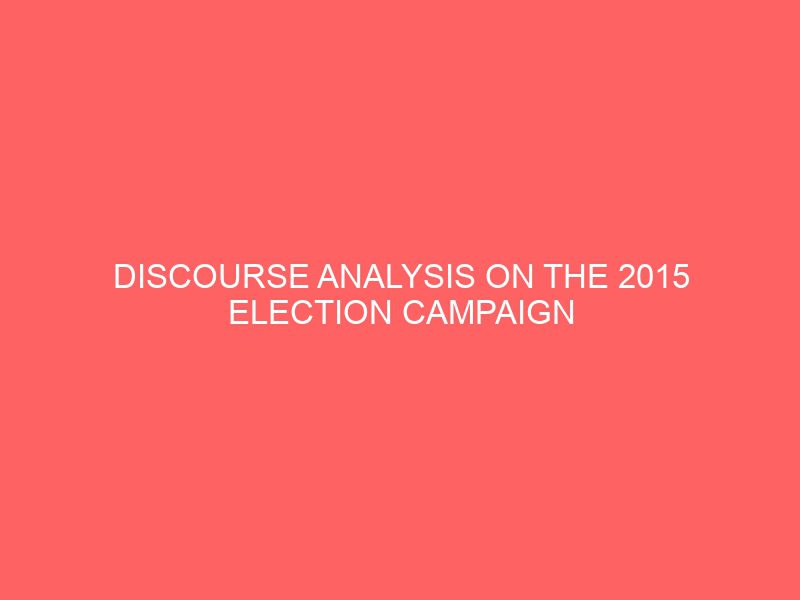
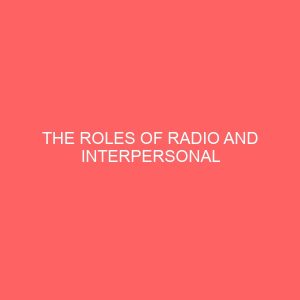
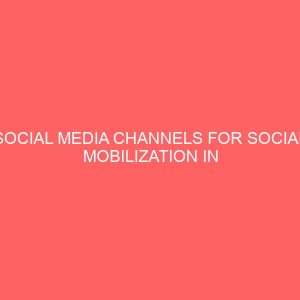
Reviews
There are no reviews yet.